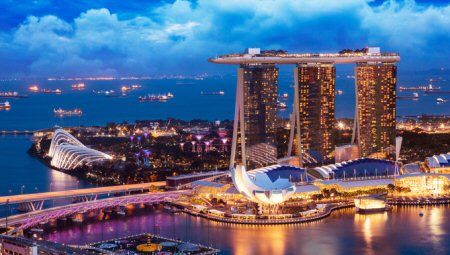A tax hike on resident entry passes is making Singapore casino slot machines far less appealing to locals.
 It’s no secret that the government of Singapore doesn’t want its citizens gambling at casinos. They do, however, want to harvest all the revenue they can from Asia’s high-rolling, gamble-happy foreigners. Seeking the best of both worlds, the country opened two mega resort casinos in 2010, the Marina Bay Sands and Resorts World Sentosa. Both are immaculate properties that, despite being the only two located on the island-state, have contributed to Singapore being consistently named among the world’s top ten countries for gambling revenue.
It’s no secret that the government of Singapore doesn’t want its citizens gambling at casinos. They do, however, want to harvest all the revenue they can from Asia’s high-rolling, gamble-happy foreigners. Seeking the best of both worlds, the country opened two mega resort casinos in 2010, the Marina Bay Sands and Resorts World Sentosa. Both are immaculate properties that, despite being the only two located on the island-state, have contributed to Singapore being consistently named among the world’s top ten countries for gambling revenue.
Well aware that telling their own citizens that they are prohibited from entering these casinos wouldn’t go over too well, the government instead decided that locals could patronize the establishments, provided they pay an entry levy to do so. Two types of passes would be issued – one lasting for 24 hour from the moment of issuance, and another that would last a full calendar year.
For affluent citizens with a passion for slots and table games, the 1-year pass was the best option. Since the casinos opened, the entrance levy for a full year pass was set at SG $2,000 (CA $1,948), compared to the SG $100 (CA $97) for a 24-hour pass. Last April, the government enforced a tax hike that’s about to hit with the coming of new year, and it could have a significant impact on how many Singapore citizens visit the gambling resorts in 2020 and beyond.
Singapore Casino Slot Machines Less Appealing to Locals
This is no meager tax hike we’re talking about. The government raised the entrance levy by a whopping 50%, no doubt with hopes of deterring more locals from entering the casinos. And with the new year approaching, the expiration date for last year’s annual passes purchased prior to the tax hike is drawing near.
Once those passes expire, locals will face a fee of SG $3,000 (CA $2,924) to renew their annual rights of entrance. The 24 hour passes became more expensive the moment the new legislation was enacted on April 4, 2019. They’ve since cost citizens and permanent residents SG $150 (CA $146).
A press release announcing the higher levy earlier this year explained that, between 2010 and 2017, the country’s problem gambling rate had dropped from 2.6% to just 0.9%; a significant reduction that the government is proud of, and wholly determined to see continue in a positive direction. Thus the 50% increase in entrance levies was implemented to support further “minimising the social impact of problem gambling”.
When the new legislation was passed, it came with a renewed 10-year contract with the two casino properties. The extension guarantees that no new casinos will open between now and 2030. As for the levy, however, it was granted a 5-year moratorium, at which time the tax will be reviewed. No doubt it won’t be decreased come 2025, but should the rate of problem gambling head in the wrong direction between now and then, it could easily see another hike applied.
If that happens, I don’t imagine Singapore casino slot machines will ever become more popular among citizens and permanent residents of the island-state. As it is, Mandalay Bay Sands is already reporting a 3.7% decline in slot machine handle year over year.









